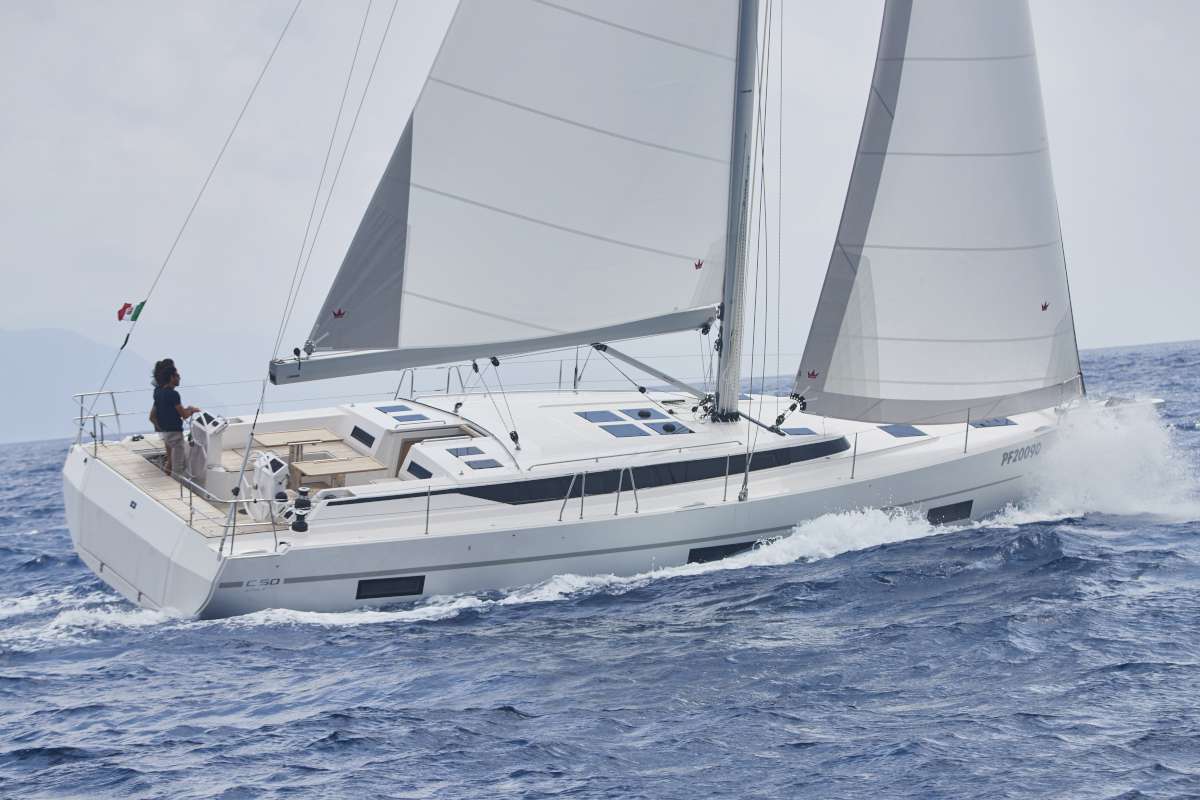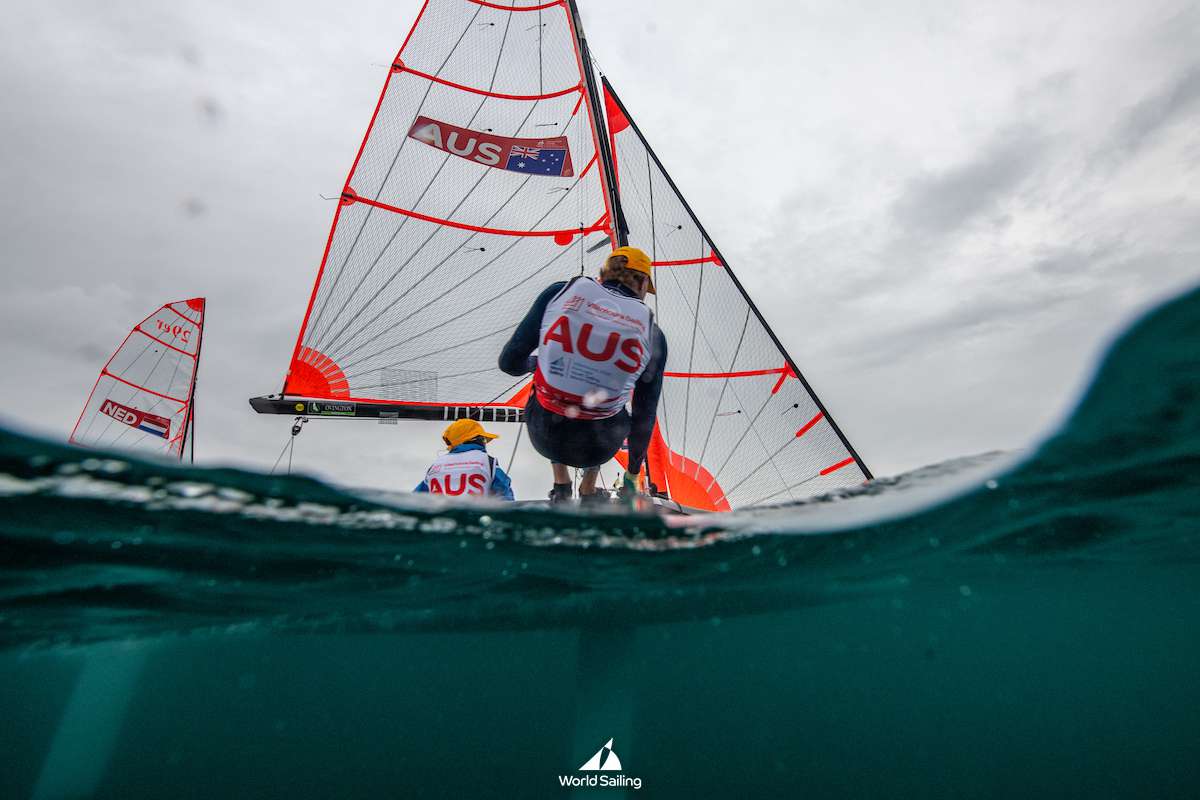Regardless of where you cruise or the size of your boat, there will be nights when it will roll.
Sometimes you make a bad anchorage judgement call. Sometimes the forecast is wrong: yes, it does happen. Sometimes you have no choice. But you can be sure that some time in your cruising life you will encounter a rolly anchorage.
For sure the boat will roll, but it is how you prepare that determines whether you enjoy a reasonable sleep or endure a night of misery. Yes, your multihull will roll too, maybe with less amplitude but certainly in a more jerky fashion.
It may not be the rolling that will keep you awake, but the noises generated by the boat almost certainly will annoy someone aboard. If this is you, some of the suggestions below may speed the onset of peaceful sleep.
On deck
Most exterior squeaking or grinding noises can be silenced, temporarily, with water.
Chuck a bucket of seawater on the offending area and see if it quietens down. If the improvement is short-lived, consider adding detergent to the water for a longer-lasting effect.
This will almost certainly make a mess and you need to clean it up before anyone has the chance to slip on the surface. It is, therefore, far better to determine the cause and eliminate the noise whenever possible.
Dinghy moving in the davits: make sure it is secured tightly and winched up fully.
Boom topping lift humming: often caused by a tight mainsheet pulling the boom down, tensioning the topping lift. Try easing the sheet or topping lift.
If this means the boom starts to swing around, try taking a line from the boom to one end of the traveller, or to the side deck; shift the traveller car to the opposite side and then use the mainsheet to triangulate against the line. This should prevent the boom from moving, without requiring excessive topping lift tension.
Squeaking from the gooseneck area when the boom is moving may respond to the same treatment. Steady the boom and stop the movement.
Halyards tapping the mast: tie them off well forward of the mast and tension them.
Rigging vibrating: usually happens in wind-against-tide conditions, or in marinas. Short-term solution is to lash the shrouds together. Tie a light line to one shroud, wrap it around its neighbour and back a few times for purchase, then pull tight. Tie it off, but remember to release the line before you sail.
The longer-term answer is to adjust the rigging, however I have known boats where no amount of rig adjustment prevents this problem when wind of a certain strength is just abaft the beam.
Mast base: squeaking or grinding noises could mean the mast heel is moving on its base. This will be damaging the mast section. Does the rigging need adjustment? Does the base sit squarely on its mount?
With a keel-stepped mast it may be the mast wedges at deck level that are squeaking. Silicone spray can help if the area is accessible.
Another annoying rigging noise comes from unsecured internal wiring. If someone has installed additional electrical wiring dangling in the centre of the mast, it is not only vulnerable to damage, but will bang around in the slightest sea. The short-term answer is to gently pull it tight and lash it. With luck you will not dislodge the top end because anyone who installs wiring like this probably has not bothered to secure the top properly either.
Permanent solution involves getting the wire into a conduit – either the built-in one behind the mainsail track, or a purpose-fitted piece.
Anchor chain or snubber noise: run the snubber through soft hose, like clear PVC. This will become brittle with time but is cheap to replace.
For an instant solution, take the weight off the snubber by winding up some chain and wrap it with rag. Likewise if the chain is noisy at the bow fitting, wrap it with rag while the weight is on the snubber. If the snubber continues to squeak, consider whether it is long enough. Perhaps it simply does not have enough stretch.
Mooring line noise can be dealt with the same way as above. Ensure the lines are nylon or silver rope. Recycling sheets and halyards as mooring lines is a sure way to produce noisy lines as they are not designed to stretch.
Anchor chains can also rattle in the spurling pipe, the tube that leads the chain below, or knock against the hull as the boat rolls. Usually just moving the chain to one side in the anchor locker will overcome the problem.
Fenders can squeak against the hull, or where the lines pass over the gunwale. Fender socks may overcome the former. Water, especially with detergent, will quieten them, at least for a while.
If you are mooring in a swell-prone area, ensure the fenders are adequate. I was recently at a pontoon in a slight swell watching the miniature fenders of the catamaran behind us being squashed flat with every roll.
In the cockpit, turn winch handles sideways and secure the leaves of the cockpit table, to prevent clunking as the boat rolls.
This is not related to rolling, but alarming anchor chain noise can be caused by strong current rushing past. Anchored near the mouth of a flooded river in the aftermath of TC Debbie, a persistent vibrating noise had us so concerned that we lifted the floorboards to check whether we had an electric pump running. It was only the sound of the chain quivering in the tide.
Another noise unrelated to rolling is the humming that emanates from the slot in masts fitted with in-mast furling. It only happens when the boat is moored with a strong breeze from aft of the beam, but is one of the most irritating sounds nearby marina dwellers will have to endure. If you have the answer for this one, please let me know.
On one boat we had the Windex squeaked as the boat rolled in calm weather. This was another noise for which I never found a satisfactory answer.
There is also the drumming of overly tight jacklines in strong winds. This one is easy, just loosen them off a bit.
Down below
Squeaky bulkheads or steps: try spraying with silicone spray.
Squeaky floorboards: for instant relief, rub the edges with soap. Longer term, consider fitting felt or silicone pads to the bearing edges.
Sink drains gurgling: roll up a small cloth and stick it in the drain. This will only muffle the sound, but makes it far more bearable.
Keep your eggs in the door of your upright fridge? Make sure they cannot roll around. The sharp motion will break down the contents of the eggshell hastening deterioration, as well as clunking as they hit each other.
Other galley noises may be refrigerator and pantry contents shifting, tins and bottles rolling and cutlery sliding. All these can be silenced by shoving cloths around them. Non-skid mats can help prevent the problem. Bottles and glasses can be sheathed with socks or stubby holders, which is a good idea anyway to prevent breakage while sailing.
A stove moving in its gimbals can be quietened either by spraying the moving parts with silicone spray, or wedging a towel underneath to prevent movement.
Secure the leaves of folding tables to prevent them swinging. Another one is clothes in hanging lockers swishing as they swing. This is not only annoying, but does the fabric no good at all. Movement in hanging lockers leads to chafe, so secure the lot with a piece of shock cord or webbing. Better still, convert the hanging locker to shelving. Check fire extinguisher tags are secured, otherwise they can click back and forth in a most annoying fashion as the boat rolls.
Fuel or water slopping in the tanks: not much can be done about this in the short term. It is usually only a problem with full tanks, but also try not to buy a boat that has tankage under the berths.
Boats with variable geometry often suffer from centre/dagger board or rudder blade rattles. Sometimes these can be wedged, often a change of height will do the trick. On my previous boat, the board would always slop if left fully down. Half up, never a sound from it.
The personal aspect
If it is the rolling rather than the noises that keeps you awake, try wedging yourself in with pillows. Sleep in the areas of least motion, down low and away from the ends of the boat. Use the lee cloths if your boat has them.
Throwing a mattress on the floor is often effective as motion is considerably reduced on the centreline. Sometimes just sleeping athwartships is enough to overcome the sensation of rolling like a log.
The ability to alter the sleeping arrangements is priceless if you have the space, especially on boats with long, flat, stern overhangs on which the sea will sometimes boom incessantly.
Of course, there are many techniques to minimise the actual rolling but these are beyond the scope of this article. If all else fails, get up, make a cuppa and read, watch a movie, or do what I did and write an article for Cruising Helmsman while you
wait for conditions to ease. Cultivating the mindset that you will not allow the noise to annoy you can help, although sharp noises may cut through your resolve.
Above all, remember: this too shall pass. ≈
























